(Note: audio version of this article is available to paid subscribers. Access here.)
Perhaps the hallmark trait of all sublimity and grandeur is a sense of changeability and extremism; like a strong Madeira or Scotch, a sublime thing, place, or experience presents those who possess it with both ecstasy and ruin at the same time. Perhaps the sense of ecstasy the thing exudes is actually heightened by the possibility of ruin; perhaps the seeker of sublime things wishes to fly to the sun, only a hair's width away from their own delirious and flaming demise. The lover is a single illicit kiss from the noose; the mountaineer who scours peaks for feverish and mystical vistas is separated from death only by the fidelity of his crampons and carabiners and ropes. And if the genius bank robber wishes to maintain his status as a street deity — he cannot wake up on the wrong side of the bed or make his coffee too weak, lest he find himself unexpectedly humbled by the stiff cots and chilling confinement of a prison cell.
One finds prison easily in the North Country; there are many of them here. Dannemorra and Gouverneur, maximum security in Malone, and the dismally-named "Riverview" — where none of the occupants, ostensibly, have even the slightest view of the river beyond their facility's walls. Some say that in places like this, if you aren't a prison guard, you're probably a prisoner — or are well on your way to becoming one. This certainly seemed true of a young man I recently met at a bar in Massena, who spoke of violent Canadian gangs trafficking Mike's Hard Lemonade across the US-Canada border. Mike's Hard Lemonade is the banner drink of rural lumpens who began drinking in their tween years; the age at which most drinkers prefer "lemonade" to bitter beer. The drink's caloric content is almost mesmerizing — 220 calories in a single twelve-ounce can and thirty-two grams of sugar. Like cans of Ensure for childhood alcoholics and desperadoes alike, my friend at the bar spoke of a recent imbroglio at the Mohawk Indian reservation where truckloads of the stuff were being trafficked through the bush. Someone found their way into state prison over it — and the sublime buzz of moving aluminum cans of sickly-sweet serum through the bramble was halted by the authorities. At least one North Country resident's chase for sublime ecstasy was harshly interdicted and summarily shut down; someone had flown too close to the sun in this sunless and perpetually overcast backwater.


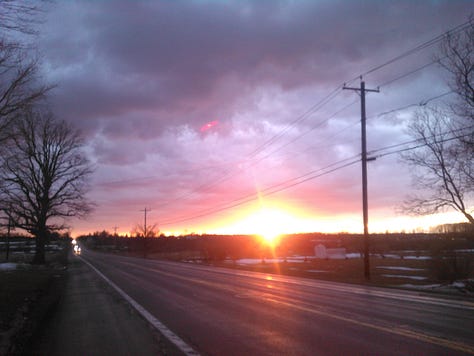
But these sordid episodes are far from me — and the prison cells of hard lemonade smugglers are, God-willing, something I'll never see. My own experience with prison is quite different. Mine is, unlike that of the convict, entirely of my own making. A web of figments ensnares me; all woven by me, carefully and with intense resolve, all arrayed as prized articles of my own quest for fortress-like solitude in an unknown and unknowable place where I know no one. The prisoner in County lockup can resent his confinement, for though his own warped agency brought him there, his continued confinement is thrust upon him rudely by so many bars and batons and legal rulings and judgements. Neckless bastards cackling in the breakroom over coffee leer at him — he and the guards have a delicate and shockingly complex choreography of mutual bitterness that can boil over into a tentative and fickle affinity that, phoenix-like, returns to violence and warlike mistrust. I have no such relationship with my own house, for I am here entirely by my own volition, and can resent nothing about the circumstances that brought me here.
When I bought this place — which I refer to somewhat wryly as my estate — I sought the sublime rewards of isolation. Solitude is, like most expressions of the sublime, at once a glorious reward and pleasure — and a bitterly hated punishment. The line between these is, in all truth, unknowable. After years of living without fixed address, having never possessed keys to my own room or apartment much less an estate, to retire from the vast and often cruel world to the south of me and into my seven-hundred-square-feet of castlelike solace is among the highest pleasures I've ever known. I had slept in parks and in closets, on porches and highway medians, I had fitfully sought the Land of Nod on the roofs of Burger Kings and in hammocks slung above early-morning joggers and on riverbanks where crackheads lurked. Running constantly, I gathered no moss with which to warm myself, and had watched countless friends disappear, or die to the world, or expire in corporeal form. Something had exhausted me, particularly during covid and my mother's terminal cancer diagnosis — and an extreme and implacable instinct governed me to buy a house in an outpost I'd never been to near the Canadian border.
Here, the pines make a tunnel outside of my hamlet through which anyone must pass to get here. They tell a story of bad farming. White pine prefers sandy soils, and the striated geology of the Saint Lawrence River Valley tells of millennia of flooding which has frosted the flat earth with Great Lakes sand on which few crops grow. Instead, river birches grow in thickets and crook-necked poplars limply slouch above great swampy wastes, and above them the white pines tower — the clear winners in the ecology of these sandblasted plains. As the wind sucks downward from the north their branches swoon; it is as if their branches are great arms, masterfully practicing Tai Chi in cool and crystalline solitude, whispering their indifference in a silent world. Often, there are no birds, no insects, no calling loons or packs of coyotes — their concert is solely their own, and they are kings of the earth in this place. Like the parklike rows of trees leading up to a Psychological Institution or detention center, this tube of trees is at once calming and unnerving — the sign that carries my mind into a lonesome peace which can effortlessly shift into delirium.
The house was forty-three thousand dollars, sold to me far under asking price. The transaction was shockingly easy; a single signature and the delivery of a cashier's check satisfied the bank. No inspections, no contingencies, nothing asked of me but a bit of ink on paper and a sum of about $6,000. Now, the mortgage is drawn from my account thoughtlessly and automatically — $405 each month. For the price of a downtown Brooklyn parking spot or the cost of a storage unit, I am a member of the landed gentry; however eccentric I could ever seem to anyone, I am above reproach in at least one respect — I am a member of the tiny percentage of adults under age thirty that owns a home. Like a Bedouin proudly boasting of his many camels and cows — "The fattest on this side of the wadi, by God!" — I sit crooked upon the rocking chair on my porch, unstoppable in my lordlike status. That is, until "cabin fever" sets in.
I am separated from the age of thirty by only ten fortnights. At such an age, a man can look back at his life and see his hallmark struggles and achievements; he can make a retrospective of his years and discern patterns both good and ill. And one of mine is the constant tension between my intense love of people and my intense repulsion at virtually all of what one must do to retain amicable access to them. I once considered that I might be a vocational hermit, calling the Archdiocese about some kind of consecrated status, embracing a life of obscurity and celibate prayer. "No, I cannot, I need people," I said, stomping on the the accelerator to get the hell away from New York City or Utica, where the people live, pridefully projecting insane opinions to push everyone away, murmuring to myself about my need for people. Sipping lager beneath my apple tree alone, I'd hear the befuddled tones of old friends on the telephone as if my own soul were floating a thousand miles above my house and body and telephone, saying things like "are you sure you want to do that?" and "aren't you sorta lonely up there?" And in truth, I was sorta lonely up here. In fact, I was now and again desperately lonely.


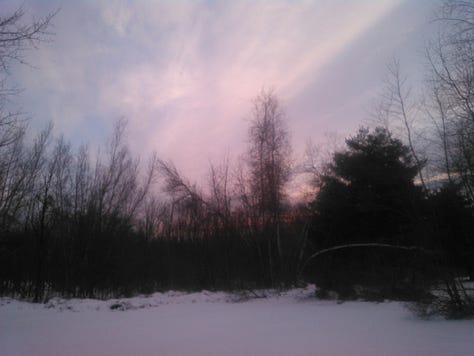
In such a state one's house is like a changeling lover; at first, she bends down sweetly, knighting her quarry with a kiss and a saccharine breath, rubbing the scruff on his neck with a healing, cool, delicate hand. Soothed by heaven herself, one relaxes thoroughly; he sleeps a richly nourishing, night-black sleep for ten straight hours in the silence of the house — he is a squire who takes his steak amid the blowing of pines, observing the silence of the turtles, serenaded by the occasional clopping of Amish buggies. And then, his changeling waif all at once shapeshifts into a demon, and he is trapped, bitten bloody by his deathly emptiness, humiliated by his idiotic decisions — a thousand years of decisions all swirling above his boiling skull. A man in such a state tries to make a telephone call but everyone is busy. He thinks to take a walk but he has already taken three walks on the only roads in town. Weeping, he grasps the Rosary, wondering whether his bizarre confinement is purposeless or if it should ever be brought to a merciful end. His estate is a sauna of prayer now; he kneels on the pinewood floorboards and hears the violent rain, sweating profusely — such hours feel like a disorienting and bitter rehearsal for his moment of judgement before Saint Peter at the gates of heaven.
When such a state comes over me, I go to Trout River.
Saluted in 1976 on the grand finale of the television show "Hee Haw", Trout River boasts one-hundred-and-fifty quiet souls. If America is a ship, isolated border hamlets like Trout River are her gunwhales; these places are at once rustic and forgetful and yet for their pristine silence and mystically rich wilderness — utterly clean and nourishing. It is as though Trout River holds all of America in the balance quietly, like Atlas, half-knowing its own unsung significance — the hidden center of America's structural balance and metaphysical tensegrity. There, few buildings stand. An old Catholic church shrinks into the thickets, boarded up. On its peeling walls, a "No Trespassing" sign hangs as a foreboding testament to the fade to black of a stolid old North Country Catholicism; its fervent heyday is a memory now. Now, the "No Trespassing" sign hangs absurdly on the dilapidated sanctuary, as if to say "you can't come to this place, but I won't maintain it either — it must stand empty," as if the building's continued existence is some sort of vague cosmic punishment for an unknown collective error. Beside this, the cemetery appears unchanged, doubtless mowed by some old codger for whom, upon his burial there, there will be no replacement. For the moment, the icy weeds lay in wait, totally conscious of the victory they will soon secure.
It was here that in 1870 a bunch of Irish rabble-rousers known as the Fenian Brotherhood attempted to attack the Dominion of Canada in hopes of aiding Ireland in her war against British oppression. They were quickly repulsed by the Canadian infantry at Huntingdon, where a single Fenian brother was shot dead. John O'Neill, leader of the men, was arrested by Vermont-based US Marshalls for violating international neutrality laws. Today, the place where the Fenians rallied before their rogue incursion into Canada hosts a defunct 'Duty Free' shop, where the cross-border liquor trade once thrived. Beside it, the Servants of Jesus and Mary — an ultra-traditionalist Catholic organization which promotes a particularly doomsday reading of the prophecies of Our Lady of Fatima — holds some real estate, including several shoddy houses and a squat little industrial building. They have since moved south to nearby Malone, demonstrating that Trout River is not a place for crusaders — whether one aims to crusade for Ireland or for Our Lady of Fatima's foreboding warnings to humanity.
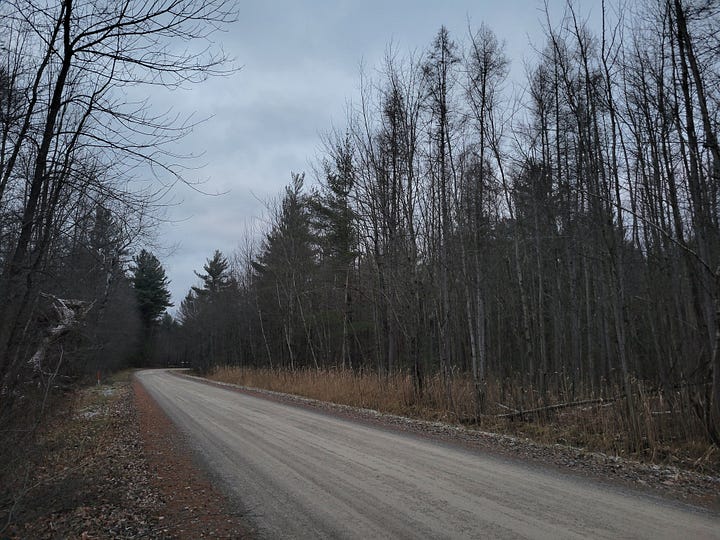

Quite to the contrary of the crusader's zeal, the aura of Trout River is restful and sleepy, almost rendering a visitor formless in the great silence of the landscape. I don't come here to pine for tax-free liquor or Latin Mass, nor do I come to prophecy Marian doom or to unite Ireland's thirty-two counties under one flag. I come for the cleansing solace of seldom-traveled public timberland. Trout River State Forest has no reviews on Google; few photographs of the land exist anywhere online. One source states that the land is 635 acres — another claims it's 532 acres. The DEC's website only describes the tract as "a rustic outdoor experience with limited amenities." The amenities are so limited that there isn't even a sign; one scarcely knows that they're on public land unless they find the few yellowed metal markers proclaiming the boundary of the state forest — most of these are ridden with bullet holes. Cell service here comes from Canada as well, so most American visitors who don't have Verizon wouldn't even have the benefit of confirming their position with GPS. And there, on the sandy, rutted truck trail, there's a tiny and unassuming parking lot which seems to be growing with telltale weeds that testify to how seldom visited this parcel is.
There is a reason for this: In a state that has more public land than the surface area of both Rhode Island and Delaware combined, it is only the especially remarkable forests that get a lot of visitors. Forests with views straight out of a National Geographic calendar; forests with extensive trails, dry and mudless foot paths, easy-to-traverse understories carpeted with nicely-packed leaf litter and lovely, well-maintained primitive campsites — these are the spots that garner the interest of most outdoorsmen. Trout River State Forest has none of this. Two abysmally-marked trails snake through the inpenetrable thickets. I've hardly seen sign of deer or turkey there. While primitive camping is legal, there are no official sites — and virtually everywhere one steps, the ground is soaking wet year-round. In the summer, the foliage grows over the trail to heights exceeding seven feet in some areas, and the bugs are hellacious even by North Country standards. And the flatness of the land drones ever onward to the banks of the Trout River itself, which appear totally unkempt and disheveled from frequent flooding. Without a doubt, enjoyment of this "rustic outdoor experience" is an acquired taste.
And yet as goes wilderness, the 'acquired tastes' are often those capable of yielding the greatest and most delicate payloads of sublimity. The "big boys" in natural splendor — the Yosemites and Glacier National Parks, the High Peaks and the Bar Harbors — are, compared with the likes of Trout River, hamfisted and brazenly self-assured. Teeming with tourists who walk the easy paths, their vistas are vaguely pornographic, like a simulation or a cartoon. Their unreality is obvious; their status as "wilderness" is dubious, for the actual wild is feral — genuinely wild things are repugnant to most civilized people. Trout River State Forest is exactly that, and for it, it bears no sign of having been exhausted by prying eyes and selfie-stick-wielding tourists by the busload. It does not even bear any but the most minimal signs of the presence of local hunters and fishermen. Instead, there are snarled prickers and upturned tree-roots; there are blowdowns and silent beaver dams and banks of icy flotsam along its northward-flowing namesake river.
Moreover, this tract is in the "borderland". Neither America nor Canada, the entire landscape around Trout River itself is hidden in some third nameless country. Like Walter White's exile in northern New Hampshire on the television show Breaking Bad, the human visitor to this place feels exiled even if he came by his own free will. "WELCOME TO CANADA: Roaming charges apply," says the text message that many cellphone users get when they arrive in these parts, and the strange heat-seeking cameras of the US Border Patrol hang over almost every road. Occasionally, one sees a migrant passing north to the Dominion or southward to the States, clutching a Jansport backpack and a bottle of Coca-Cola, whispering in Spanish or Arabic. Yet Trout River is far from Caracas and further from Lahore. Trout River is even far from America.


And the land's status as a borderland is apparent even in the ecology of the place. Along the river, one sees the delineation between ravaging gusts of blowdown wind and the repetitious cycles of freeze-thaw-flood along the river's surface. A downed tree along the banks has overturned its roots, ass-over-tea-kettle, half of its base dipped into the mangling currents of the intermittently belligerent river, the other half warped in a mire of broken branches and fallen limbs, wrecked by heavy cold winds. These 'borders', along with the international border itself, comprise the brilliant and often unknowable fine line that all genuine articles of the sublime possess — the line between ecstasy and ruin, between acquired tastes and comforting bites of satisfaction and ease. It is here that I can relinquish the harrowing depths of my isolation at my estate; I scowl as I make the drive, shouldering my ineffable burden, burden that pins me down onerously — and as I arrive at the river, I drop my bags and float into these borders, transitioning again from ruin to ecstasy, ascending back into the indifferent blessing of the towering basilica of pines. And as I lean against them and survey the tumnult of the waters below, I heave a life-giving breath back into my chest and sigh, whole again, enriched, richer than any man on earth. When I will "go back down" is never known to me, but for now I am secure. These are the cycles of the northern borderlands.
Enthroned upon frozen sand, I hide. For a moment, I wonder at the glowing lights of the border patrol station, half-convinced I am a Eritrean national hell-bent on becoming a dishwasher in Montreal, colder now than I have ever been in my old life amid the banana trees and cacao. I wake up. Now I am the Border Patrol agent, sent to this empty place by my superiors after a narrow brush with death in a cartel gunfire sortie at Laredo, using night vision goggles to spot the migrantes — a word that has the same spelling in both Spanish and French. No, I am not that either. The floodwater chases the paddocks of pancake ice — duty-free, bound for Quebec by inland waterway — and I bite down on a piece of driftwood. No sign of beaver. A pang of hunger — I am a human being again.
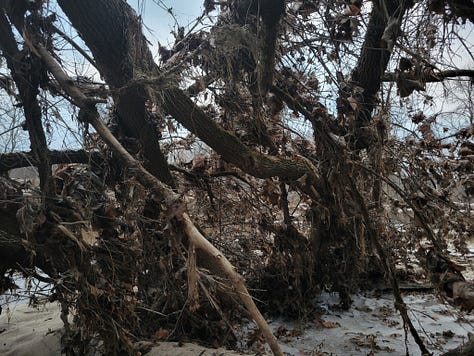

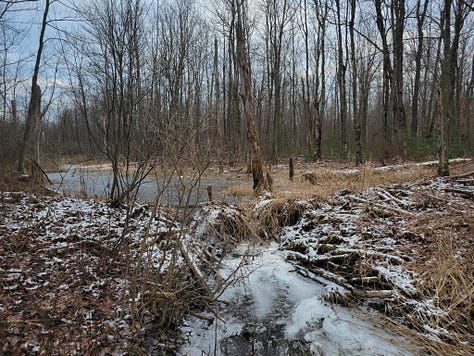
Some find my reflections on matters like these to be grim and somber, or depressing. To my mind they are the opposite. Just as the true meanings of warmth — both literally, as in the woodstove, and figuatively, as in love — are exposed by the hoary winds of winter, a holistic view of the human condition is contained in the feral and un-peopled corridors of icy pine and gnarled, mossy roots. I do not come here to make my lamentations as a dead end, I come here as an alchemist, transmogrifying whatever burns me into a hope that is so complete it underscores the value of my own life and the world that made it. After a cleansing soak in such a place as Trout River State Forest, I can beam brightly at the Mohawk man who fills up my gas tank; I can shake an elder's hand at the American legion over a pint, remembering the barley grower and truck driver and the barkeep and their good-willed benevolence. Perhaps the central hope of human spirituality is to soften the heart. Weak and childlike, the soft heart is blown like a hot wisp into the calloused hands of the broken; it arrives as the substrate of pure hope and ultimate love. Only a liar can soften his heart with sweet nothings and picture-perfect vistas; at a certain point, the whole picture must be held in view, however rattling it is to behold. Come too close and it will end you; linger too long and you will be savaged by death and her brooding cycles — but catch a glimpse, and the heart is rendered jolly and friendlike. It is the bit of honeycake in the vagabond's dusty satchel, taken in storm-wracked caves, shared among human brothers when the battle has sputtered into a sobering web of impossibilities. This nourishment makes the human project possible in spite of its contradictions and dualities; indeed, it is the essence of every worthwhile thing.
And so it is that I send a postcard from Trout River; a place to which I owe a great deal. But this essay is not about Trout River, not really. It is about every slandered and forlorn piece of wasteland; every fallow field and rejected swamp and bleak salt flat in America. These lands hold the key to healing the heart and rejuvenating the innermost 'mind of the heart' — known to the Eastern Orthodox as the 'nous' — and starting anew. Such places cannot support life long to any but great mystics. But one who enters one of these places broken and tearfully will, without a doubt, leave enriched and consoled. I shall always make a forceful defense of the scorned parcels and seldom-visited lands such as the state forest at Trout River; I exhort you to make a trip to such a place yourself. That it is winter should not give you any pause. Go during winter — go when it is coldest and the wind blows the harshest. This is where the sublime things live easily. The forest is surprised you've come; and indeed, an unexpected guest is treated well in such feral quadrants of the good earth.




10 fortnights shy of 31 and writing such wisdom as this, Mr. Hickman, which is sweet in my heart. I, too, at 71 years old, live not quite as backwater as you, but very rural and no cities in sight for hundreds of miles, with winters where everything closes down and the land becomes bleak, but oh so holy in the vast solitude it invites me into. How timely to read Heavenly Wasteland this morning as I have been on my own the past 5 weeks with my husband on a walkabout, and have been alternating between the rapture of my aloneness and your words, "his changeling waif all at once shapeshifts into a demon, and he is trapped, bitten bloody by his deathly emptiness, humiliated by his idiotic decisions." In your intimate painting of Trout River, I know this is a place I would feel drawn into like a bee into the cup of a blossom. I've always been drawn to places as you describe and are fortunate to have there in your moments of acute loneliness. Thank you for sharing Trout River and bestowing her into my imagination....I already love her deep silence in the winter.
Lovely, evocative. Is it better to be alone or with people? I can tell you, at 68, it’s still hard to say. There’s a Texas saying that applies to either condition: “I’ve enjoyed just about all of this I can stand.”
Keep up the beautiful work. Much appreciated.